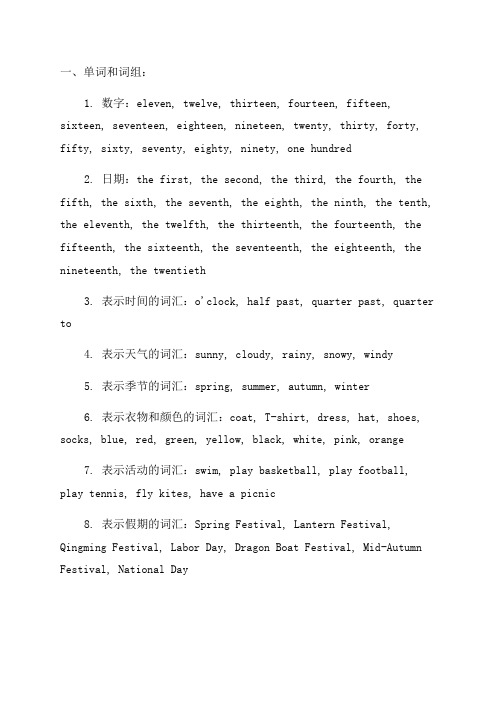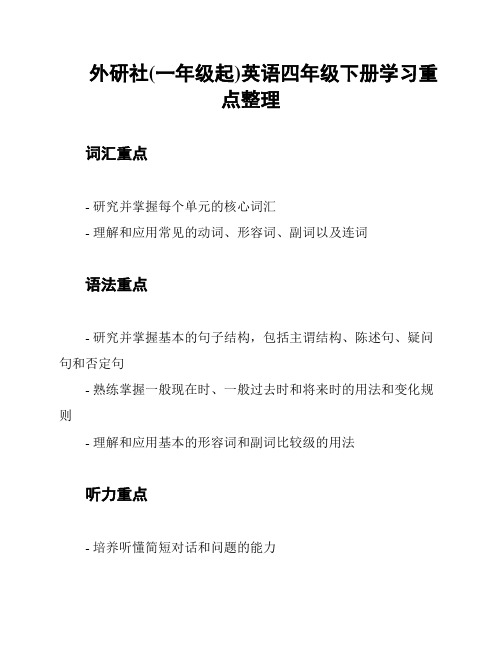完整word版,外研社小学英语一起小学四年级下语法总结及练习题,推荐文档
(完整word版)外研版小学英语语法总复习知识点归纳

(完整word版)外研版小学英语语法总复习知识点归纳外研版小学英语语法总复知识点归纳一、时态1.一般现在时(1)表示经常发生的动作或事情,通常用“usually通常,often常常,every…每…。
sometimes有时,always总是,”等词。
(2)基本结构:主语I / You / We / They /He / She / It肯定句:主语+动词原形或动词第三人称单数形式否定句:主语+don’t + 动词原形或者doesn’t + 动原一般疑问句(Yes/No) Do…。
Yes。
I do.No,I don’t.Does…(动词原形)…?Yes,he/she does。
No,he/she doesn’t.特殊疑问句What do …。
How does she…(动词原形)…?(3)动词第三人称单数方式(同名词单数酿成复数办法不异)1.普通情形+s如:walk-walks2.辅音字母+y结尾去y +ies fly-flies3.结尾是s。
x,sh。
ch +es watch-watches4.结尾是0 +es do-does。
go-goes5.特殊have-has2.现在进行时(1)表示正在发生的动作,通常用“now现在。
look看,XXX听”.(2)根本方式: be +动词-ingeg: I am(not) XXX.You/We/They are(not) reading。
He/She/It is(not) eating.What are you doing。
Is he reading?(3)动词的目前分词方式(动词+ing)普通情形+ing walk—walking末端是不发音的e-e+ingcome—coming重读闭音节双写末了一个字母+ingswim-swimming。
run-running3.一般过去时(1)表示过去已经发生的事情,通常用“last …上一个…。
just now刚才,many years ago许多年前,XXX昨天”等词。
外研社小学英语一起小学四年级下语法总结及练习题

外研社小学英语一起小学四年级下语法总结及练习题祈使句练题表达说话人对对方的叮嘱、劝告、请求或命令等,往往有表示请求、命令、希望、禁止、劝告等意思。
祈使句一般没有主语,实际上是省略了主语"You"。
句末用感叹号或句号,用降调朗读。
肯定结构都以动词原形开头。
祈使句的肯定句式有三种形式,即:1) Do型(以行为动词原形开头),例如:Sit down坐下!Stand up起立!2) Be型(以be开头),例如:Be quiet!安静!3) Let型(以let开头),例如:Let me help you.祈使句的否定结构是以"Don't+动词原形"开头。
例如:Don't go there。
please。
请别去那儿。
Don't be late。
不要迟到。
用括号内所给动词的适当形式填空。
1.Don't be late.2.Dust the dressing table.3.Don't speak with your mouth full of food.4.Don't talk and read a book.5.Don't drop the nice vase。
Sam.6.Look out。
A car is coming.7.Give us ten years and just see what our country will be like.8.Don't let the baby cry.9.Open the window and shut the door.10.Let'XXX.根据要求改写句子1.Read it again more slowly。
please。
(改为祈使句)2.Don't sit next to Nancy。
(改为否定句)1.There are no us formatting errors in the article。
外研版小学四年级英语下学期知识点总结

一、单词和词组:1. 数字:eleven, twelve, thirteen, fourteen, fifteen, sixteen, seventeen, eighteen, nineteen, twenty, thirty, forty, fifty, sixty, seventy, eighty, ninety, one hundred2. 日期:the first, the second, the third, the fourth, the fifth, the sixth, the seventh, the eighth, the ninth, the tenth, the eleventh, the twelfth, the thirteenth, the fourteenth, the fifteenth, the sixteenth, the seventeenth, the eighteenth, the nineteenth, the twentieth3. 表示时间的词汇:o'clock, half past, quarter past, quarter to4. 表示天气的词汇:sunny, cloudy, rainy, snowy, windy5. 表示季节的词汇:spring, summer, autumn, winter6. 表示衣物和颜色的词汇:coat, T-shirt, dress, hat, shoes, socks, blue, red, green, yellow, black, white, pink, orange7. 表示活动的词汇:swim, play basketball, play football, play tennis, fly kites, have a picnic8. 表示假期的词汇:Spring Festival, Lantern Festival, Qingming Festival, Labor Day, Dragon Boat Festival, Mid-Autumn Festival, National Day9. 形容词:big, small, tall, short, long, short, thin, fat, heavy, light, strong, weak, fast, slow, happy, sad, angry, hungry, thirsty, excited, scared, tired10. 情态动词:can, can't, could, couldn't, may, may not,will, won't, shall, shall not, must, must not二、基本句型和语法:1. 一般疑问句:Is it...? Are you...? Do you like...? Does he have...?2. 肯定回答:Yes, it is. Yes, I am. Yes, I do. Yes, he does.3. 否定回答:No, it isn't. No, I'm not. No, I don't. No, he doesn't.4.一般现在时的肯定句:主语+动词原形+其他5. 一般现在时的否定句:主语 + 动词原形 + not + 其他6. 一般现在时的一般疑问句:Do/Does + 主语 + 动词原形 + 其他?7. 一般现在时的特殊疑问句:Wh- + do/does + 主语 + 动词原形 + 其他?8. there is/there are 句型:There is + 单数名词 + 其他;There are + 复数名词 + 其他9. can/can't 句型:主语 + can/can't + 动词原形 + 其他10. could/couldn't 句型:主语 + could/couldn't + 动词原形 +其他11. can/could 提示:Can you...? Could you...? Yes, I can. Yes, I could.12. may/may not 句型:主语 + may/may not + 动词原形 + 其他13. will/won't 句型:主语 + will/won't + 动词原形 + 其他14. shall/shall not 句型:主语 + shall/shall not + 动词原形+ 其他15. must/must not 句型:主语 + must/must not + 动词原形 + 其他三、课文内容:1. Unit 1: How Do You Go There?(交通工具的使用方式)2. Unit 2: How Was Your Day Yesterday?(过去一天的活动)3. Unit 3: What's Your Hobby?(运动和爱好)4. Unit 4: What's the Day Today?(日期和天气)5. Unit 5: What Season Do You Like?(季节和天气)6. Unit 6: What Are You Wearing?(衣物和颜色)7. Unit 7: Can You Swim?(运动技能)8. Unit 8: What Did You Do in the Holidays?(假期活动)9. Unit 9: Whose Is It?(物品所有者)10. Unit 10: What Can You Do?(能力和兴趣)四、日常对话和口语表达:1. 问候:Hello! Hi! Good morning! Good afternoon! Good evening! Nice to meet you!2. 自我介绍:My name is... I am... years old. I am from...3. 询问他人的姓名和年龄:What's your name? How old are you?4. 询问他人的住所:Where do you live?5. 询问他人的过去活动:What did you do yesterday? Did you...?6. 询问他人的兴趣爱好:What's your hobby? Do you like...?7. 询问日期和天气:What's the day today? What's the weather like today?8. 询问季节和喜好:What season do you like?9. 询问衣物的颜色和穿着:What color is it? What are you wearing?10. 询问他人的能力:Can you...?以上就是外研版小学四年级英语下学期知识点的总结。
完整word版外研版小学英语语法及习题汇总,文档

小学英语语法及习题16.一、名词复数规那么写出以下各词的复数I_________him_________this___________her______watch_______child_______photo________diary______day________foot________book_______dress________tooth_______sheep______box_______strawberry_____thief_______yo-yo______peach______sandwich______man______woman_______paper_______ juice___________water________milk________rice__________tea__________二、一般现在时一般现在时用法专练:〔一〕、写出以下动词的第三人称单数drink________go_______stay________make________look_________have_______pass_______carry____come________watch______plant_______fly_____ ___study_______brush________do_________teach_______〔二〕、用括号内动词的适当形式填空。
Heoften________(have)dinnerathome.DanielandTommy_______(be)inClassOne.We_______(notwatch)TVonMonday.Nick_______(notgo)tothezooonSunday.______they________(like)theWorldCup?What_______theyoften_______(do)onSaturdays?_______yourparents_______(read)newspaperseveryday?Thegirl_______(teach)usEnglishonSundays.SheandI________(take)awalktogethereveryevening.There________(be)somewaterinthebottle.Mike_______(like)cooking.They_______(have)thesamehobby.Myaunt_______(look)afterherbabycarefully.Youalways_______(do)yourhomeworkwell.15.I_______(be)ill.I ’mstayinginbed.She_______(go)toschoolfromMondaytoFriday.LiuTao_______(do)notlikePE.Thechildoften_______(watch)TVintheevening.SuHaiandSuYang_______(have)eightlessonsthisterm.20. -Whatday_______(be)ittoday?It’sSaturday.〔三〕、按照要求改写句子1.DanielwatchesTVeveryevening.(改为否认句)___________________________________________________2.Idomyhomeworkeveryday.(改为一般疑问句,作否认答复)________________________________________________________Shelikesmilk.(改为一般疑问句,作肯定答复)___________________________4.Amylikesplayingcomputergames.(改为一般疑问句,作否认答复)___________________________________________________5.Wegotoschooleverymorning.(改为否认句)_______________________________________________________6.HespeaksEnglishverywell.( 改为否认句)___________________________________________________7.Iliketakingphotosinthepark.( 对划线局部提问)________________________________________________________8.JohncomesfromCanada.(对划线局部提问)___________________________________________________9.Sheisalwaysagoodstudent.(改为一般疑问句,作否认答复)________________________________________________________10.SimonandDaniellikegoingskating.(改为否认句)___________________________________________________〔四〕、改错(划出错误的地方,将正确的写在横线上)1.Is yourbrotherspeakEnglish? __________________2.Doeshelikesgoingfishing? __________________3.Helikesplaygamesafterclass. __________________4.Mr.WuteachsusEnglish. __________________Shedon’tdoherhomeworkonSundays._________________三、现在进行时〔一〕、写出以下动词的现在分词:play________run__________swim_________make__________go_________like________ write_________ski___________read________have_________sing ________dance_________put_________see________buy_________love____________live_______take_________come________get_________stop_________sit________begin________shop__ _________〔二〕、用所给的动词的正确形式填空:boy__________________(draw)apicturenow.2.Listen .Somegirls _______________(sing)in theclassroom.3.Mymother_________________(cook)somenicefood now.4.What_____you______(do)now?Look.They_______________(have)anEnglishlesson.____________(not,water)theflowersnow.7.Look!thegirls________________(dance)intheclassroom.isourgranddaughterdoing?She_________(listen)tomusic.9.It ’s 5 o’clocknow.We_____________(have)suppernow10.______Helen____________(wash)clothes?Yes,sheis.〔三〕、句型转换:1.Theyaredoinghousework.(分别改成一般疑问句和否认句) ______________________________________________________________________________________________________________________2.Thestudentsarecleaningtheclassroom.(改一般疑问句并作肯定和否认答复)______________________________________________________________________________________________________________________3.I’mplayingthefootballintheplayground.(对划线局部进行提问)___________________________________________________________ 4.Tomisreadingbooksinhisstudy.( 对划线局部进行提问)四、将来时练习:填空。
四年级下册英语外研一起点知识要点汇总

Contents四年级下Module 1 (1)四年级下Module 2 (3)四年级下Module 3 (7)四年级下Module 4 (10)四年级下Module 5 (13)四年级下Module 6 (17)四年级下Module 7 (22)四年级下Module 8 (27)四年级下Module 9 (31)四年级下Module10 (35)四年级下Module 1重点:Do 型祈使句让别人不要做某事的句型表达“某人可以……"的句型难点:让别人不要做某事的句型短语make crisps 制作炸薯片wash the potatoes 清洗马铃薯cut the potatoes 切马铃薯touch the machines 触摸机器a bag of crisps 一袋炸薯片feed the fish 喂鱼walk on the grass 践踏草坪play ball games 玩球类游戏write on the books 在书上写(字)惯用表达式Sorry.对不起。
Look! 看核心句型1.Don't touch the machines, please!请不要触摸这些机器解读这是劝告他人不要做某事的句子。
2.You can each have a bag of crisps.你们每个人都可以拥有一袋炸薯片。
解读这是表达“某人可以……"的句子。
了解句型1.The baby is sleeping.这个婴儿正在睡觉。
解读这是表达某人正在做某事的句子。
2.Sing for the baby! 为婴儿唱歌!解读这是建议他人做某事的 Do 型肯定祈使句。
Unit 1 知识点精析1.Don't touch the machines, please!请不要触摸这些机器。
这是劝告他人不要做某事的句子。
【句型结构】Don't+动词(短语)原形(+其他)【噩点解析】这是一个 Do 型祈使句的否定形式。
外研社(一年级起)英语四年级下册学习重点整理

外研社(一年级起)英语四年级下册学习重
点整理
词汇重点
- 研究并掌握每个单元的核心词汇
- 理解和应用常见的动词、形容词、副词以及连词
语法重点
- 研究并掌握基本的句子结构,包括主谓结构、陈述句、疑问句和否定句
- 熟练掌握一般现在时、一般过去时和将来时的用法和变化规则
- 理解和应用基本的形容词和副词比较级的用法
听力重点
- 培养听懂简短对话和问题的能力
- 提高听懂日常生活中关于时间、地点、人物和活动的问题的能力
- 研究听懂简短故事并提取关键信息的能力
口语重点
- 练运用学过的词汇和句型进行简单的日常会话
- 学会表达自己的观点、感受和喜好
- 提高与他人交流和合作的能力
阅读重点
- 通过阅读短文和故事,培养理解和抽取关键信息的能力
- 学会根据文中提供的信息回答问题
- 提高阅读时的语音和语调的表达能力
写作重点
- 练书写短文和简单的句子,描述自己的家庭、朋友和学校生活
- 学会运用所学词汇和语法结构进行基本的写作对话和情景
以上是外研社(一年级起)英语四年级下册的学习重点整理。
通过重点的学习和实践,学生们将能够提高听说读写的能力,更好地运用英语进行交流和表达。
(完整版)外研社小学英语一起小学四年级下语法总结及练习题

(完整版)外研社⼩学英语⼀起⼩学四年级下语法总结及练习题外研社英语⼀起四年级上语法总结及练习题祈使句表达说话⼈对对⽅的叮嘱、劝告、请求或命令等,往往有表⽰请求、命令、希望、禁⽌、劝告等意思.句末⽤感叹号或句号,⽤降调朗读.肯定结构都以动词原形开头. 祈使句⼀般没有主语,实际上是省略了主语“You”.祈使句的肯定句式有三种形式,即1)Do型(以⾏为动词原形开头),例如:Sit down 坐下! Stand up 起⽴!2)Be型(以be开头),例如:Be quiet!安静!3)Let型(以let开头),例如:Let me help you.祈使句的否定结构是以“Don’t+动词原形”开头.例如:Don’t go there,please.请别去那⼉.Don’t be late.不要迟到⽤括号内所给动词的适当形式填空。
1. __________ (not, be) late.2. ____________ (dust) the dressing table.3. ____________ (not, speak) with your mouth full of food.4. ____________ (not, talk) and ____________ (read) a book.5. ____________ (not, drop) the nice vase, Sam.6. ____________ (look) out! A car is coming.7. ____________ (give) us ten years and just see what our country will be like.8. ____________ (not, let) the baby cry.9. ____________ (open) the window and ____________ (shut) the door.10. Let’s ____________ (sweep) the floor.根据要求改写句⼦1. Will you please read it again more slowly? (改为祈使句)__________ __________ again more slowly, please.2. Please sit next to Nancy. (改为否定句)__________ __________ next to Nancy.3. Come to my house tomorrow. (改为否定句)__________ come to my house tomorrow.4. Wear the glasses! (改为否定句)___________ wear the glasses!5. Don’t wash your hands! (改成肯定句)___________ your hands!⼀般过去时时间状语:1.yesterday,morning(afternoon,evening)等2.由“last+⼀时间名词”构成的短语:last night,last year(winter,month,week)等3.由“时间段+ago”构成的短语:a moment ago,a short time ago,an hour ago等4.其它:just now等Was,were的⼀般过去时构成:肯定句式:主语+be(was,were)+其它.否定句式:主语+be(was,were)+not+其它.⼀般疑问句:Be(was,were)+主语+其它?肯定回答: Yes, 主语+ be(was,were)否定回答:No, 主语+be(was,were)+not.含有实义动词(⾏为动词)的⼀般过去时的主结构:构成:肯定句:主语+动词的过去时+其它。
外研社小学英语一年级起点四年级下册 Module2 单词练习+语法练习

Module2 单词练习+语法练习
一、根据句子的中文含义填写单词
1.I can _______ an ______ to you.
我可以发送一封邮件给你。
2.It _______s one hundred and eight _______.
它花了108元。
3.This bag is _______.
这个书包是蓝色的。
4.These flowers are _______.
这些花是粉色的。
5.This pen is _______.
这只钢笔是便宜的。
6.This football is _______.
这个足球是贵的。
7.What ______?
什么颜色?
二、判断这些单词划横线部分的自然拼读是否一致,一致打✔,不一致打×
三、把下面的句子从陈述句变成一般疑问句,并且翻译一般疑问句。
举例:
She is nice.
一般疑问句:Is she nice?
中文:她友好吗?
1.It is cheap.
一般疑问句:
中文:
2.This pen is expensive.
一般疑问句:
中文:
3.This flower is beautiful.
一般疑问句:
中文:
4.The bag is blue.
一般疑问句:
中文:。
- 1、下载文档前请自行甄别文档内容的完整性,平台不提供额外的编辑、内容补充、找答案等附加服务。
- 2、"仅部分预览"的文档,不可在线预览部分如存在完整性等问题,可反馈申请退款(可完整预览的文档不适用该条件!)。
- 3、如文档侵犯您的权益,请联系客服反馈,我们会尽快为您处理(人工客服工作时间:9:00-18:30)。
外研社英语一起四年级上语法总结及练习题
祈使句
表达说话人对对方的叮嘱、劝告、请求或命令等,往往有表示请求、命令、希望、禁止、劝告等意思.
祈使句一般没有主语,实际上是省略了主语“You”.句末用感叹号或句号,用降调朗读.肯定结构都以动词原形开头.
祈使句的肯定句式有三种形式,即
1)Do型(以行为动词原形开头),例如:Sit down 坐下! Stand up 起立!
2)Be型(以be开头),例如:Be quiet!安静!
3)Let型(以let开头),例如:Let me help you.
祈使句的否定结构是以“Don’t+动词原形”开头.例如:
Don’t go there,please.请别去那儿.
Don’t be late.不要迟到
用括号内所给动词的适当形式填空。
1. __________ (not, be) late.
2. ____________ (dust) the dressing table.
3. ____________ (not, speak) with your mouth full of food.
4. ____________ (not, talk) and ____________ (read) a book.
5. ____________ (not, drop) the nice vase, Sam.
6. ____________ (look) out! A car is coming.
7. ____________ (give) us ten years and just see what our country will be like.
8. ____________ (not, let) the baby cry.
9. ____________ (open) the window and ____________ (shut) the door.
10. Let’s ____________ (sweep) the floor.
根据要求改写句子
1. Will you please read it again more slowly? (改为祈使句)
__________ __________ again more slowly, please.
2. Please sit next to Nancy. (改为否定句)
__________ __________ next to Nancy.
3. Come to my house tomorrow. (改为否定句)
__________ come to my house tomorrow.
4. Wear the glasses! (改为否定句)
___________ wear the glasses!
5. Don’t wash your hands! (改成肯定句)
___________ your hands!
一般过去时
时间状语:
1.yesterday,morning(afternoon,evening)等
2.由“last+一时间名词”构成的短语:last night,last year(winter,month,week)等
3.由“时间段+ago”构成的短语:a moment ago,a short time ago,an hour ago等
4.其它:just now等
Was,were的一般过去时构成:
肯定句式:主语+be(was,were)+其它.
否定句式:主语+be(was,were)+not+其它.
一般疑问句:Be(was,were)+主语+其它?
肯定回答: Yes, 主语+ be(was,were)
否定回答:No, 主语+be(was,were)+not.
含有实义动词(行为动词)的一般过去时的主结构:
构成:
肯定句:主语+动词的过去时+其它。
否定句:主语+did+not+动词原形+其它。
did not缩写为didn’t
一般疑问句:Did+主语+动词原形+其它?
特殊疑问句:特殊疑问词+did+主语+动词原形+其它?
动词的适当形式填空
1. I________up at half past six this morning.(get)
2. My mother____________a lot of fruit yesterday afternoon.(buy)
3. They_________________a meeting yesterday.(not have)
4. The twins_________thirteen two years ago.(be)
5. I_________(have)an exciting party last weekend.
6. They all_________(go)to the mountains yesterday morning.
7. She_________ (not visit)her aunt last weekend.She________(stay)at home.
8. He __________(work) in that bank four years ago.
9. I __________(see) him yesterday.
10. The boy __________(have) a bad cold yesterday.
11. He __________(tell) a story to his daughter yesterday.
12. I __________(buy) a coat just now..
用括号里动词的适当形式填空
Last year Mr. Smith ___________ (go ) to China and Japan. He ___________ (have) a wonderful time. He ___________ (do) a lot of different things and ___________ (talk) to a great number of different people. He ___________ (eat) Chinese and Japanese food and ___________ (visit) a lot of interesting places. When he ___________ (go) back to England, he ___________ (be) very tired.
现在进行时
定义:表示现在或现阶段正在进行或发生的动作或存在的状态。
构成:由be(am/is/are)+动词-ing形式构成
常用的时间状语:“now”“look”“listen”“at the (this) moment”.
I am doing my homework now.
Look! My mother is running!!!
Listen! They are reading.
At the (this) moment, he is only weeping.
1. A: What is she_____________(do)?
B: She_______________(cook)dinner in the kitchen now.
2. Listen! Who _________________(sing)?
3. A: What___________ they ____________(do)?
B: They__________________(run)on the grass now.
4. Are they_____________(fly)kites? Yes, they are.
5. A: ___________the girls____________(catch)the butterflies?
B: No, they aren't. They____________ (pick)up leaves.
6. Bob _______________(swim)in the pool now.
7. They are_______________(make) a snowman.
8. The boys _________________(take) pictures in the garden now.
9. It's 12:00,the students ______________(have) lunch in the canteen now.
10. My father_______________(wash) his car outside now.
11. A: ______________ your brothers ______________(play) computer games now? B: Yes, they are.
12. I like_____________(dive) and________________(swim).
13. Look! The kangaroo_______________(jump), and the panda_________________ (sleep).。
